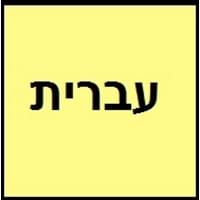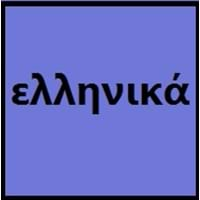Countries
Israel
Cyprus, European Union, Greece
National Language
Israel
Albania, Cyprus, Egypt, France, Greece, Italy, Romania, Turkey, Ukraine
Second Language
Israel
Roman Empire
Speaking Continents
Africa, Asia, Europe
Asia, Europe
Minority Language
Poland
Albania, Armenia, Australia, Hungary, Italy, Romania, Turkey, Ukraine
Regulated By
Academy of the Hebrew Language
Center for the Greek language (Κέντρον Ελληνικής Γλώσσας)
Interesting Facts
- The original language of Bible is Hebrew.
- The men and women use different verbs in hebrew language.
- Greek is the longest documented language of all the Indo-European Langauges.
- The official language of education in the Roman Empire was Greek.
Similar To
Arabic and Aramaic languages
Armenian
Derived From
Aramaic Language
Latin
Alphabets in
Hebrew-Alphabets.jpg#200
Greek-Alphabets.jpg#200
Scripts
Hebrew
Arabic, Latin
Writing Direction
Right-To-Left, Horizontal
Left-To-Right, Horizontal
Hello
שלום (Shalom)
γεια σας (geia sas)
Thank You
תודה (Toda)
ευχαριστώ (ef̱charistó̱)
How Are You?
מה שלומך? (ma shlomxa)
πώς είσαι (pó̱s eísai)
Good Night
לילה טוב (Laila tov)
Καληνυχτα (Kali̱nychta)
Good Evening
ערב טוב (Erev tov)
καλησπέρα (kali̱spéra)
Good Afternoon
אחר צהריים טובים (Achar tzahara'im tovim)
Καλὸ ἀπόγευμα (Kaló apóyevma)
Good Morning
בוקר טוב (Boker tov)
καλημέρα (kali̱méra)
Please
בבקשה (bevekshah)
παρακαλώ (parakaló̱)
Sorry
סליחה! (Slicha)
συγνώμη (sygnó̱mi̱)
Bye
להתראות (Lehitraot)
αντίο (antío)
I Love You
אני אוהבת אותך (Ani ohevet otcha)
Σε αγαπώ (Se agapó̱)
Excuse Me
בבקשה!
Με συγχωρείτε! (Me synhoríte)
Dialect 1
Ashkenazi Hebrew
Cappadocian Greek
Where They Speak
Israel
Greece
How Many People Speak
Not Available
Dialect 2
Samaritan Hebrew
Griko
Where They Speak
Israel, Palestine
Italy
How Many People Speak
Not Available
Dialect 3
Yemenite Hebrew
Mariupol
Where They Speak
Israel
Ukraine
Speaking Population
Not Available
Second Language Speakers
Not Available
Native Name
עברית / עִבְרִית (ivrit)
ελληνικά
Alternative Names
Israeli, Ivrit
Ellinika, Graecae, Grec, Greco, Neo-Hellenic, Romaic
French Name
hébreu
grec moderne (après 1453)
German Name
Hebräisch
Neugriechisch
Pronunciation
[(ʔ)ivˈʁit] - [(ʔ)ivˈɾit]
[eliniˈka]
Ethnicity
Not Available
Greeks or Hellenes
Language Family
Afro-Asiatic Family
Indo-European Family
Subgroup
Semitic
Hellenic
Branch
Canaanitic
Not Available
Early Forms
Biblical Hebrew, Mishnaic Hebrew, Medieval Hebrew, Hebrew
Proto-Greek, Mycenaean Greek, Ancient Greek, Koine Greek and Medieval Greek
Standard Forms
Modern Hebrew
Modern Greek
Signed Forms
Signed Hebrew
Greek Sign Language
Scope
Individual
Individual
ISO 639 6
Not Available
ells
Glottocode
hebr1246
gree1276
Linguasphere
12-AAB-a
56-AAA-a
Language Type
Living
Living
Language Linguistic Typology
Subject-Verb-Object, Verb-Subject-Object
Subject-Verb-Object
Language Morphological Typology
Fusional, Synthetic
Fusional, Synthetic
Hebrew and Greek Greetings
People around the world use different languages to interact with each other. Even if we cannot communicate fluently in any language, it will always be beneficial to know about some of the common greetings or phrases from that language. This is where Hebrew and Greek greetings helps you to understand basic phrases in Hebrew and Greek language. Hebrew word for "Hello" is שלום (Shalom) or Greek word for "Thank You" is ευχαριστώ (ef̱charistó̱). Find more of such common Hebrew Greetings and Greek Greetings. These greetings will help you to be more confident when conversing with natives that speak these languages.
Hebrew vs Greek Difficulty
The Hebrew vs Greek difficulty level basically depends on the number of Hebrew Alphabets and Greek Alphabets. Also the number of vowels and consonants in the language plays an important role in deciding the difficulty level of that language. The important points to be considered when we compare Hebrew and Greek are the origin, speaking countries, language family, different greetings, speaking population of these languages. Want to know in Hebrew and Greek, which language is harder to learn? Time required to learn Hebrew is 44 weeks while to learn Greek time required is 44 weeks.





